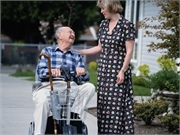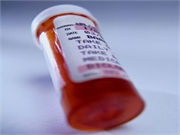Relationship Between Alzheimer Disease, Sleep Patterns Explored
No evidence supporting causal role of disturbed sleep patterns on AD or between major depression and AD
CDC: In 2018, 5.1 Percent of Adults Engaged in Heavy Drinking
Likelihood of engaging in heavy drinking up for adults who felt worried, nervous, anxious, depressed
Poll: More Older Adults Using Telehealth During Pandemic
Comfort level with technology and telehealth visits increasing, but some concerns persist
Health Worse for Baby Boomer Caregivers Versus Noncaregivers
More caregivers have at least one chronic health condition, more often have frequent mental distress
Homelessness Tied to Higher Readmission Rates
Readmission rates higher across most common reasons for hospitalizations, but rates vary across states
Racial Health Disparities Exist Among Pro Football Players
Former black players, those of other races report worse physical, mental health than white players
CNS-Active Meds Often Prescribed for Older Adults With Dementia
Overall, Rx filled for antidepressants in 49.8 percent, opioids in 29.8 percent, anxiolytics in 26.8 percent
Yoga Superior to Stress Education for Generalized Anxiety Disorder
But yoga not as effective as cognitive behavioral therapy, which should remain first-line treatment
Mortality Down but Health Care Costs Up From Gun Violence
Head and neck, vascular, gastrointestinal surgery independently linked to high cost tertile designation
Rates of Prescription Opioid Use Higher in Cancer Survivors
Cancer survivors have similar rates of prescription opioid misuse versus those without cancer



















